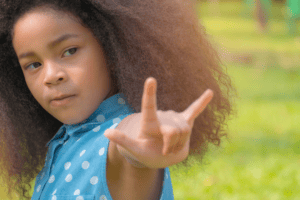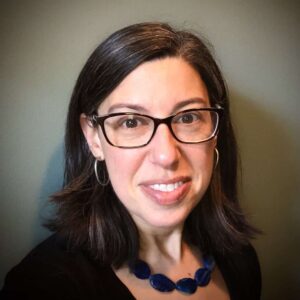
My daughter can hear the doorbell ring — once in a while. She can hear dogs barking and she says something that sounds a lot like “bless you” when you sneeze. She sings “Wheels on the bus” without any recognizable English words, but with a close enough approximation of the tune that anyone would recognize it.
“Is she completely deaf?” people ask me all the time. But that’s the wrong question.
Medically speaking, she’s hard of hearing, but this child is capital-D Deaf from head to toe. Even at 3, she’s drawn like a magnet to the capital-D Deaf community: people who are proud of their culture and love the expressiveness of American Sign Language. The first time she spent the night at our house, when she was almost 2, she went home with a dozen new signs. She was a little sponge searching for a way to communicate and she has not stopped soaking it all up.
The Deaf community that she is part of is not a “disabled” community; this is a community that sees the world’s lack of interest in making things fully accessible as the real disability. This is a community with a not-so-distant history of being sent to institutional schools where they were forced to read lips, made to sit on their hands, and punished for using sign language. (Read more about why ASL is so important for Deaf babies).
Their pride – of course — emerged from their experience of this long-term distress. As her mom, my hope is that she’ll develop this pride without experiencing the oppression.
When people learn I have a Deaf child, the first question is usually whether we plan to get “those implants that will help her hear.” That’s a complicated question and every family feels different about this one. Deaf and hearing people tend to see this issue very differently. But here’s where we landed on that question: why would we fix something that isn’t broken?
I don’t see a problem to fix.
I see a resilient, whip-smart child who doesn’t miss anything. A child who spent her first two years in foster care without language of any kind, but who, after 18 months in her new home, NEVER. STOPS. SIGNING. (Seriously. Never. She gives new meaning to chatterbox).
I don’t mean to brush over her real need for school accommodations and parent advocacy. She goes to a school for Deaf children. She has hearing aids (nope! she won’t wear them!) that require new molds every other month for her growing ears. Her immediate family members are still learning her primary language. She talks all day, but strangers understand maybe one in ten words. The Deaf community has high rates of unemployment and so I worry about her future. And of course there are the ridiculous, ignorant questions: today’s version was: “Does she read Braille?”
We all have built-in limitations. I’m short, so you’ll never find me on the basketball court. But there are so many other things out there for me that it’s no loss.
So when people argue She is missing one of her senses. How can you not want to fix that?, I think about who she is: A child with a strong community of Deaf friends, teachers, and mentors. A girl who starts the party when she enters a room. A classmate who is the first on the scene when someone gets hurt on the playground. A little sister who held her big brother in her arms for an hour the night before he started school. A huge goof who laughs at everything. A great dancer. Nothing is missing.
It’s hard to know that the first thing many people see is “a girl who can’t hear.” So it’s my job to support her in any way I can to make sure that people will also see her as the whole, amazing, extroverted little person she is.
On Friday nights in my house, we light Shabbat candles and say a special blessing to each of our children: “Be who you are, and may you be blessed in all that you are.” As parents, could we wish for anything else?
* This post was first published at Support for Special Needs in 2011 with the title “If it ain’t broke, don’t fix it.”




